Vol 5 No. 45 TROPIC LIGHTNING NEWS November 23, 1970
Index
| Unit Page | Unit Page | Unit Page | Unit Page |
| 1/5 4 | 2/22 3 | 25th Med. 8 | 3/4 Cav Photo 8 |
| 1/5 Photo 4 | 2/34 1 | 3/22 1 | 4/23 1 |
| 1/5 Arty Photo 8 | 2/34 Photo 7 | 3/4 Cav Photo 1 | 65th Engr. 3 |
| 2/12 3 | 25th Med. 2 | 3/4 Cav 6 | 65th Engr. 7 |
| 2/14 3 | 25th Med. 8 | 3/4 Cav 7 | OB Lynch 8 |
| 2/14 7 |
Allies Sweep South from
Xuan Loc
Nationals, Tomahawks Kill 56
By PFC MIKE ROBERTS
XUAN LOC - Troops of a 25th Division mechanized unit, teaming with
Regional Forces (RFs) of Xuan Loc District, recently killed 56 enemy during a combined
operation four miles south west of here.
The RFs and Bravo Company of the 4th Battalion (Mech), 23rd Infantry, were
operating in thick jungle where the Regionals had made contact the previous day. The
Tomahawks set up a day laager position from which the friendlies were sweeping the area.
Minutes after several units of RFs began to move through the jungle, the
Bravo laager site began to take a barrage of enemy mortar fire. At the same time, RF
elements came under heavy small arms fire.
Tomahawks of the 3rd platoon opened up on the suspected enemy mortar
positions with .50 caliber and M-60 machine gun fire after spotting smoke from the
Communist guns.
"All of us heard the 'thoops' of the rounds being dropped and we saw the
smoke from the tubes about 150 yards out," said Specialist 4 Tom Redmond of Dwight,
Ill.
The laager position was also receiving sniper fire, but couldn't answer it
because of the RFs operating to their front. However, once the RFs moved back to the
laager site, the allies began to lay down an overwhelming barrage of their own.
Meanwhile, on the opposite side of the area, another group of nationals were
fighting aggressively and charging the enemy positions.
"At one point I saw them charging the enemy and firing their weapons at
the same time," said Specialist 4 Rich Jimenez of Tucumcari, N.M., a track commander.
"They really did a good job."
After the enemy broke contact, artillery and gunships pounded the area
unmercifully. As a result of the allied teamwork and fire power, 56 enemy dead were
found. Of these, 47 were credited to the Regional Forces and nine to the US troops.
Regulars And Ghosts Spend
Night Together
By SP4 KRIS PETERSEN
OPERATION BASE LYNCH - In the boonies there are many nights when sights
and sounds send chills up and down GI spines. This was the case recently with Alfa
Company, of the 25th Division’s 3rd Battalion, 22nd Infantry.
Discovery
While conducting a company-size RIF (reconnaissance-in-force) of heavy
jungle, one of Alfa's platoons discovered the body of an enemy soldier killed on an
earlier mission. The platoon had then continued on to further search the area and
returned later that evening to set up their NOP (night operations position).
It was then that a point man, Private First Class Michael Karaberis of
Manchester, N.H., noticed that two figures were covering up the dead body.
"I thought they might be ARVNs because of the green ponchos they were
wearing, so I hesitated to open up," he said. However, a few of the other
Regulars noticed that under the ponchos were black pajamas.
At that moment, the enemy spotted the Regulars. A brief fire fight then
ensued.
Not Sure
"I thought that I had hit one, but I wasn't positive," said
Sergeant Dan Whittaker of Ewing, Mo.
The monsoon rains then began to fall heavily and with darkness quickly
approaching, the men set up in their NOP. During that night the Regulars could hear
the ghostly moaning of a dying enemy.
Ghostly
The next morning a small unit was sent to the site where the sounds had
been coming from. But all they found was the same dead NVA.
"I've never believed in ghosts before" said one wary Regular,
"but after that night's experience I'm not so sure."
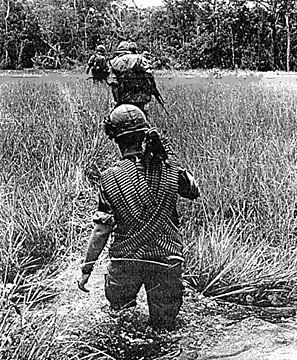 Tankers Outflank
Enemy
Tankers Outflank
Enemy
By SP4 EUGENE DETHAIR
DAU TIENG -: While reconning south of a nearby rubber plantation, an
element of the 25 Division's 2nd Battalion, 34th Armor, foiled an enemy ambush recently
and killed one NVA in the process.
As Headquarters Company tanks neared a woodline, the recon tracks came under
sniper fire.
The Dreadnaughts advanced toward the sound of the firing until the company
commander, Captain John A. Buckley III of South Portland, Me., noticed that they were
being drawn into an ambush.
Buckley immediately ordered the tracks to positions at the flanks of the
enemy force. When the smoke had cleared the tankers claimed one NVA killed and an
AK-47 rifle captured .
KNEE DEEP - This trooper of the 3rd Squadron, 4th Cavalry is finding the going a little wet during an operation in and about the Boi Loi Woods. (Photo by SP4 Howard Lavick.)
| Letter from the 25th Division commander To the Officers and Men of the 25th Division: On this day of Giving Thanks, all Tropic Lightning Soldiers should pause and reflect on the blessings of the past year, and for this, our last Thanksgiving together as a Division in Vietnam. During this past year, we have served far from our homes and loved ones. We had not the privilege of sharing a traditional Thanksgiving dinner with our families, nor a chance to enjoy at first hand the warmth of our Country. Instead, we found ourselves manning a perimeter of freedom, offering a helping hand to other peoples. And what have we accomplished during the past four-plus years? For what can we give thanks? We can commemorate the completion of the bulk of the 25th Division’s mission in Vietnam made possible through your Dedication, your Service, and the Sacrifices made by you and your predecessors during these past years. Not only have you helped attain a condition of economic stability and freedom from aggression for the Vietnamese, but you have given them an understanding of our Thanksgiving day, a desire for an attainment of freedom, a freedom we have always known. The first Thanksgiving was an expression of gratitude by the Pilgrim fathers for survival and of appreciation for the freedom they had found in a strange new land. Their determination to preserve that freedom and their resolve to overcome the dangers which confronted them formed a heritage which Americans have preserved at all costs throughout our Nation’s history. To every Soldier of the 25th Infantry "Tropic Lightning" Division, I express appreciation for the vital contributions you are making to the preservation of peace at home and the struggle for peace here in the Republic of Vietnam. God Speed, Edward Bautz, Jr. |
Page 2 TROPIC LIGHTNING NEWS November 23, 1970
Decorated
| SILVER STAR | |
| SGT James E. Boone, Co C, 1st Bn (Mech), 5th Inf SGT Jack Hollingsworth, Co C, 4th Bn, 9th Inf SGT Jackie Steinman, Co C, 4th Bn, 9th Inf SP4 John R. Miles, Co C, 1st Bn (Mech), 5th Inf |
SP4 Carl R. Smith, B Trp, 3rd Sqdn, 4th Cav PFC Robert Jackson, Co C, 4th Bn, 9th Inf PFC Ronald T. Leno, Co B, 4th Bn (Mech), 23d Inf |
BRONZE STAR |
|
| LTC Marvin Rosenstein, HHC, 1st Bn, 27th Inf CPT John H. Maddox Jr, HHB, 1st Bn, 8th Fld Arty 1LT David A. Decker, Co A, 1st Bn (Mech), 5th Inf 1LT Ralph L. Gazaway, Co C, 4th Bn, 9th Inf 1LT John W. Thompson Jr, B Trp, 3rd Sqdn, 4th Bn 1LT Charles B. White, Co A, 4th Bn, 9th Inf 1LT William E. Williams, Co A, 2nd Bn, 27th Inf SFC Roger L. Jackson, Co A, 1st Bn (Mech), 5th Inf SSG William H. Herbert, Co B, 4th Bn (Mech), 23rd Inf SSG Lawrence P. Sydow, Co B, 4th Bn (Mech), 23rd Inf SSG Calvin Taylor, Co C, 4th Bn, 9th Inf SGT Jack Buchanan, Co C, 1st Bn (Mech), 5th Inf SGT Joseph Christopher, Co C, 4th Bn, 9th Inf SGT Merrill Clark, Co E, 2nd Bn, 12th Inf SGT Richard Emm, B Trp, 3rd Sqdn, 4th Cav SGT Richard Fanguy, Co E, 2nd Bn, 12th Inf SGT Eugene Hess, Co C, 4th Bn, 9th Inf SGT Bobby LaPrarie, Co C, 1st Bn, 27th Inf SGT Richard Mitchell, Co C, 4th Bn, 9th Inf SGT John A. Sotnick, Co B, 4th Bn (Mech), 23rd Inf SGT Gregory Yahn, Co C, 4th Bn, 9th Inf SP5 Frank G. Cain III, Co B, 1st Bn (Mech), 5th Inf SP5 Larry D. Jones, B Trp, 3rd Sqdn, 4th Cav |
SP4 Daniel J. Cathcart, Co B, 1st Bn (Mech), 5th Inf SP4 Billy J. Connor, B Trp, 3rd Sqdn, 4th Cav SP4 Dennis L. Dayton Co B, 2nd Bn, 27th Inf SP4 Louis C. Espinoza B Trp, 3rd Sqdn, 4th Cav SP4 Dalton Goodrich, Co C, 4th Bn, 9th Inf SP4 Chris F. Iden, Co D, 1st Bn (Mech), 5th Inf SP4 Ronald L. Jones, B Trp, 3rd Sqdn, 4th Cav SP4 Robert McCusker, Co E, 2nd Bn, 12th Inf SP4 Salvatore Misurace, B Trp, 3rd Sqdn, 4th Cav SP4 Edward Oliver, Co E, 2nd Bn, 12th Inf SP4 Joel W. Patton, B Trp, 3rd Sqdn, 4th Cav SP4 Fazza M. Saleh, B Trp, 3rd Sqdn, 4th Cav SP4 William R. Swilling, B Trp, 3rd Sqdn, 4th Cav SP4 Samuel R. Yates, Co C, 1st Bn (Mech), 5th Inf PFC Phillip A. Annunziato, B Trp, 3rd Sqdn, 4th Cav PFC Robert J. Eder, Co C, 1st Bn, 27th Inf PFC Harvey D. Gardner, Co C, 1st Bn, 27th Inf PFC Kary N. Lynch, Co C, 4th Bn, 9th Inf PFC Terry J. Nadaus, Co C, 1st Bn, 27th Inf PFC Larry J. Putman, F Co, 75th Inf PFC William G. Taylor, Co A, 4th Bn, 23d Inf PFC Floyd D. william, A Trp, 3d Sqdn, 4th Cav PFC Stanley Wyzientek, Co C, 1st Bn, 5th Inf |
Medical Clearing
Stations
A New Idea In Medical Care
By SP4 J. D. DRURY
CU CHI - An integral part of the 25th Medical Battalion's mission is the
operation of forward clearing stations or dispensaries. Two such operations are now
supporting 25th Division troops, one at Dau Tieng and another at Xuan Loc. The 25th
Infantry Division is implementing a new concept in division level medical care.
"Before, all maneuver battalion's had their own surgeon assigned to
them, but because of rapid helicopter evacuation, the battalion Medical Corps officer,
once located in the field, is now no longer as necessary there," stated Major Robert
Fulton, MSC, of Omaha, Neb., executive officer of the battalion.
And so the Division Surgeon's Office has initiated a policy of brigade level
medical support setting up clearing stations wherever Tropic Lightning brigades establish
their headquarters.
The facilities at the clinic in Xuan LOC, which cares for Tropic Lightning
2nd Brigade troops are similar to those at its sister institution in Dau Tieng. Both have
treatment rooms, a pharmacy, laboratory, X-ray facilities, wards, and a medical supply
office. Both facilities also have dental and optometry services.
The 25th Med operates each clearing station in conjunction with another unit.
At 1st Brigade headquarters in Dau Tieng, medics of the 2nd Battalion, 14th Infantry help
run the aid station, while in Xuan Loc, battalion corpsmen share the facility with their
counterparts in the 11 Field Force's 5th Battalion, 2nd Field Artillery.
For several years 25th Med's Delta Company operated a major medical facility
in Tay Ninh. The battalion also supported division operations in Cambodia with doctors and
corpsmen at forward aid stations at Katum and Thien Ngon.
Much of the treatment at both aid stations is routine: suturing cuts, lancing
boils, changing dressings, giving shots, and doling out medicines for ringworm, rashes,
runny noses and the like.
"But the routine is quickly broken when a Dustoff comes in," stated
Private First Class Greg Garvin of Bakersfield, Calif.
What may seem like "organized chaos," as Roswell, N.M., medic
Specialist 5 Jim McClanahan puts it, "is often medics quickly performing life-saving
actions."
''We generally average between 75 and 100 patients per day," stated
Specialist 4 Angel Juazer of Long Beach, Calif., one of Xuan Loc's laboratory technicians.
"Another part of our mission," said Sergeant First Class Benjamin
Stewart of Ogden, Utah, NCOIC of the Dau Tieng Clearing Station, "is a preventive
medicine program. Our medics help in inspecting the living and dining areas of troops on
the base camp."
Overall, the brigade level approach to health problems seems to be working
well.
"Air mobility makes this approach possible," commented Lieutenant
Colonel David Arbiter, MC, 25th Division Surgeon and 25th Medical Battalion Commanding
Officer. "Few of the brigade troops operate more than 15 minutes by chopper away from
one of the clearing stations " he added, "and the doctors and medics admirably
handle all but the most seriously injured patients."
The TROPIC LIGHTNING NEWS is an authorized publication of the 25th Infantry Division. It is published weekly for all division units in the Republic of Vietnam by the Information Office, 25th Infantry Division, APO San Francisco 96225. American Forces Press Service and Army News Feature materials are used. Views and opinions expressed are not necessarily those of the Department of the Army. Printed in Tokyo, Japan, by Pacific Stars and Stripes.
MG Edward Bautz, Jr . . . . Commanding General
MAJ Robert E. Kelso . . . Information Officer
1LT Martin E. Webb . . . . Officer-in-Charge
SP5 William M. Lane . . . . Editor
SP4 Scott Watson . . . . . . Assistant Editor
SP4 Michael Winston . . . Production Supervisor
BATTALION CORRESPONDENTS
| SGT Derr Steadman SGT Mike Bailey SGT Bryon Fites SGT Mark Rockney SGT Mike Conroy SGT Daniel House SGT Jack Strickland SGT Dan Davis SGT Bob Lodi SP5 Tom Watson SP5 Doug Sainsbury SP4 Frank Salerno SP4 Tom Benn SP4 Greg Duncan |
Discom 4/23 4/23 2/12 3/4 Cav 4/9 1/27 1/27 1/5 725th 2/77 2/22 7/11 2/27 |
SP4 John Corbin SP4 Rich Erickson SP4 Ed Toulouse SP4 William McGown SP4 James Duran SP4 Kris Peterson SP4 Frank Morris SP4 Phillip Maslin PFC Dan Lowry PFC James Stoup PFC Doc Polis PFC Dan Danley PFC Mike Roberts PFC Richard Haley |
1/5 2/14 2/12 Divarty 3/13 3/22 2/34 2/27 2/27 65th Eng 269th 4/23 4/23 1/8 |
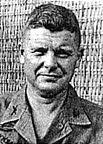 |
CHANGE OF COMMAND -Colonel William R. Todd of Manchester, N.H., recently took command of the 3rd Brigade. Col. Todd comes to the 3rd Brigade from Military Assistance Command (MACV), where he served as Secretary of the Joint Staff and special assistant to the Chief of Staff (MACV). |
Page 3 TROPIC LIGHTNING NEWS November 23, 1970
EATEN BY WHAT? - (Photo
below, right) A Regular from the 2nd Battalion (Mech) 22nd Infantry, appears to be
swallowed up by his track as he takes out the last remaining screws prior to removing his
blown engine. Triple Deuce’s new maintenance program has eliminated the delay in
sending the tracks to rear areas to be repaired. (Photo by SP4 Dennis Leblanc)
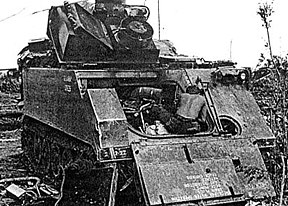 Breakdowns Reduced
Breakdowns Reduced
Maintenance Program Started
By SP4 DENNIS LEBLANC
CU CHI - The men of the 2nd Battalion (Mech), 22nd Infantry, would never
deny the advantages in mobility and firepower provided by their armored personnel
carriers. However, on occasion, the vehicles have been a mixed blessing
In an effort to avoid as many breakdowns and delays as possible, Triple Deuce
has initiated a comprehensive field maintenance program.
First, each driver has a list of items he must check daily. He is issued a
checklist for the items and his platoon leader is held accountable if the work is not
completed.
Second, there are periodic inspections of the tracks by trained mechanics
(maniacs) to insure that proper maintenance is being pulled on each track.
Third, facilities for major overhauls have been set up right in the field.
Previously, if a track had need of a new engine or transmission, it had to be towed to Cu
Chi. Now there are few major overhauls that cannot be done right in the field.
Teamwork is the key to Triple Deuce's maintenance program. It takes the
drivers, mechanics and resupply personnel all working together to keep a mechanized
infantry unit at full strength.
Reunited By 65th Engineers Two
Brothers Get Together
By SP4 JAMES D. STOUP
CU CHI - Headquarters and Headquarters Company of the 65th Engineer
Battalion has reunited two brothers from Illinois, both serving in the Republic of
Vietnam.
James Veasey, age 22 re-knotted the family ties with his brother Willie, age
21, when the latter arrived to the 65th Engineers on August 20th. The Veasey
brothers hail from Rock Island, Illinois.
James, better known around HHC as VC, entered the Army in December 1969 and
completed basic training at Fort Campbell Ky., and Advanced Individual Training at Fort
Polk La., where he acquired a 76A10 MOS in supply. He arrived in Cu Chi on May 14, and has
worked in S-4 and R & U for the 65th Engineers.
Willie entered the Army in March, 1969 and took his basic training and AIT at
Fort Leonard Wood, Mo., where he received his cook's MOS. He served as a cook at Fort
Sill, Okla., for 14 months before coming to Nam. He arrived in the republic on May 31, and
was assigned to the 199th Light Infantry Brigade. Willie served in this capacity as a cook
both at his unit’s base camp at Long Binh, and in the field at Fire Support Bases
Mace and Trap.
After two months in country, Willie decided to put in for a transfer to his
brother's unit, the 65th Engineer Battalion. His transfer was approved, and he arrived in
Cu Chi on August 20. The younger Veasey is now a cook for HHC 65th Engineers.
Willie described his stay in Long Binh as compared to Cu Chi in this manner:
"In Long Binh there were more places to go, but it was also more stateside. I like Cu
Chi better. I haven't had to go out into the field and because I can be with my
brother."
James said that he had talked to his brother on the phone when he arrived in
Vietnam, and from that time on they started planning on their eventual rendezvous.
Motor Pool Resident Leads A
Dog’s Life
By SP4 Ed Toulouse
DAU TIENG - Rumors around this 25th Division base camp have it that the
longest member in residence with the 2nd Battalion, 12th Infantry, leads a dog's life.
This veteran Warrior has fraternized with the men of the battalion's motor
pool for almost two and a half years, yet he's never worked on an engine, repaired a flat
tire nor indulged in any of the tasks typical of a repair shop.
In fact, most of his time is spent sleeping under a bunk, or perhaps taking
an occasional ride in a jeep -industrious he's not.
Despite his shortcomings Snoopy (that's his name) Is easy to get along
with-unless one happens to be another dog. He's rather reluctant about canine visitors in
his repair shop.
Unlike his comic strip namesake, Snoopy makes no pretense at fame - he has
never flown a Sopwith Camel, nor played hockey. But not withstanding his lackadaisical
attitude, this Warrior quadruped has proven himself.
"Every time we have incoming, Snoopy can be counted on to start barking
and head for the bunker before the first round hits," said Sergeant Charley (Brown)
Schaub of Muskegon, Mich. --"Apparently he can hear the rounds as they fly through
the air."
IT'S HAPPENING
WELL, WELL NOW...We were leafing through a sheaf
of civic actions material one afternoon recently in search of a story, when we happened on
a tidbit that snapped us out of our somnolence. A civic actions officer was presenting
paper, reasons why a certain bridge should be built from one side of a body of water to
the other. He had about 10 pros and only one or two cons recorded on his tally sheet, so
it would appear that there was some merit to the project. What caught our eye, however,
was con number two. "If the bridge is built," he said, "it will put two
fairy operators out of business." That seems a rather queer statement to make.
GOING HOME: PART 1....There are several little
items you’ll not be allowed to ship home in your hold baggage. Porno for one. Nice
folks at customs told us that GIs can get by with an issue or two of Playboy, however. Or
the "Tropic Lightning News." Among the prohibited items are several you already
know about: fire arms, grenades, dope-that stuff. But did you know that you can't take
home liqueur candy? Or articles originating in Communist China, North Korea or North
Vietnam? Or goods made by convict labor or indentured labor under penal sanctions. Also,
you can't send home an unaccompanied plant. And if you want to give someone in the world
the bird, you can't do it from Vietnam. No birds. No fatigues either. You'll fly home in
your underwear unless you can scrounge some khakis.
WHAT IS THE ARMY HOLDING IN RESERVE FOR YOU?...When
you say goodbye to Vietnam, DEROS and ETS you'll still have a reserve commitment...but not
as stiff a one as the guy who has never been to riceville. You see, you won't have to
attend weekly or monthly meetings. The only hang up is that for two years, you may have to
go to summer camp and play Army for two weeks. After that, you have two years of inactive
reserve during which time you cannot be called up except to fight in a declared war or
national emergency declared by Congress.
The Army will likely assign you to a unit within 90 days after your ETS. But,
be careful. Don't try to elude the Great Green Machine. Because if they catch you trying
to skip out on the reserve commitment, they’ll call you to active duty to serve out
the remainder of your six year obligation.
Alfa Company Wins
Inter-Battalion Test
By SP4 GARY PETERSON
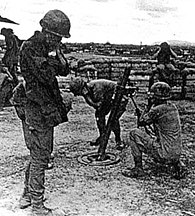 DAU TIENG - "We've got the best mortarmen in the battalion." So said 25th
Division Platoon Sergeant Bobby Seals of Fayetteville, N.C., and Alfa Company 2nd
Battalion, 14th Infantry, after his platoon won an inter-battalion mortar test here
recently. All of the battalion's companies were involved in a week of review as the
mortarmen practiced what they had learned in advanced individual training (AIT).
DAU TIENG - "We've got the best mortarmen in the battalion." So said 25th
Division Platoon Sergeant Bobby Seals of Fayetteville, N.C., and Alfa Company 2nd
Battalion, 14th Infantry, after his platoon won an inter-battalion mortar test here
recently. All of the battalion's companies were involved in a week of review as the
mortarmen practiced what they had learned in advanced individual training (AIT).
The men attended classes in the mornings and ran practice fire missions in
the afternoons. Enthusiasm ran high for the training as the winning gun squad was to
receive an in-country R & R.
After it was announced that Alfa had won, the winners let everyone know it by
placing several rounds on a nearby hill in rapid succession.
Some of the men swore the white smoke from the rounds spelled ALFA in the
sky.
OUTGOING - Mortarmen of the 2nd battalion, 14th
Infantry, plug their ears in anticipation of the round about to go off. Weapons platoons
of the "Golden Dragons-' recently underwent a week long review of skills they learned
in Advanced Individual Training. (Photo by SP4 Gary Peterson)
Page 4 - 5 TROPIC LIGHTNING NEWS November 23, 1970
Remember When We Humped
By SGT BOB LODI
BEARCAT – A mechanized unit rarely leaves its armored personnel
carriers except for a few three day hikes which are fondly recalled over a beer as
"remember when we humped."
The recent mission of the 25th Division’s Charlie Company, 1st
Battalion (Mech), 5th Infantry was one of those memorable jaunts. The objective
was to check out some thick jungle terrain inaccessible by tracks.
The landing zone was a clearing in the jungle just large enough for one
chopper to get in at a time.
"As we came down, I noticed piles of dirt in the midst of the green to
our right," said Sergeant Norm Shirley , a Bobcat squad leader from Jamestown, N.D.
"My thoughts were that we were going to get a greeting from Charlie."
The insertion went without incident, however, although indications were that
two days earlier, about 20 enemy had dug in at that location.
The Bobcats regrouped and headed out on the first leg of their three-day
walk. As the first day came and went, the mechmen adapted to the routine of living
out of the infamous rucksack.
"I never was a Boy Scout, but I had a shelter up in no time," said
Private First Class Fred Davis of Valdosta, Ga. "It must have been incentive stirred
by threatening skies."
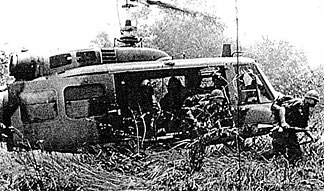 The tall grass became jungle and the jungle became
high forest as the second day became into the third. There was still no trace of the enemy
as the final grid square was covered.
The tall grass became jungle and the jungle became
high forest as the second day became into the third. There was still no trace of the enemy
as the final grid square was covered.
"After three days of rain, I felt like a sponge," said Davis.
"We met no enemy though, which wasn’t a big consolation.
"Walking wasn’t as bad as I expected," said Private First
Class Bob Michaels of Berkley, Mich. "But as I approached the laager site, those
tracks looked like heaven." Michael opened his track’s ice chest, pulled out a
soda and took a good cold slug. "Yep," he said, "there’s no place like
home."
MOVING OUT – Carrying a shovel in one hand and
an M-16 in the other, SFC Jerry Harris of Fort Campbell, Ky., a platoon sergeant with
Charlie Company, 1st of the 5th, leads his squad out of a chopper
and to cover.
Page 6 TROPIC LIGHTNING NEWS November 23, 1970
War
Correspondence—I’m Hooked On it’
By 1LT RICHARD HARRIS
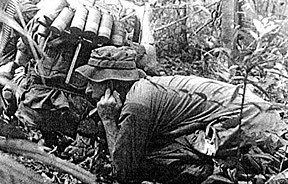 DAU TIENG - "War can become a narcotic for some people-after
a while, they can't do without it. Perhaps I'm one of those people "
DAU TIENG - "War can become a narcotic for some people-after
a while, they can't do without it. Perhaps I'm one of those people "
Derek Wilson is the Saigon correspondent for Agence France Presse and British
Broadcasting Corporation, and has been a foreign correspondent since 1959. In 1961, he
covered his first conflict the East African Mutinies involving the armies of Kenya and
Tanzanika. Since then it has been one war, revolution, and coup-d'etat after another.
Since the Cambodian operation, the Vietnam War correspondents have been more
concerned with the political and economic situation in Saigon than with the actual
fighting. For Wilson, however the excitement and anxiety of war are chiefly to be found on
the ground with the combat troops - the "grunts."
In the field, though, Wilson looks conspicuously out of place. A small,
slender man in his late 30s he is armed only with a camera and notebook.
With the Aero Rifle Platoon of the 3rd Squadron, 4th Cavalry on a recent
search of an enemy bunker complex, Wilson walked stooped over, as if ready to hit the
ground at the least sign of trouble. When startled by M-60 fire from the platoon, he did
hit the ground and covered his Pentax camera. At the cry of "fire in the hole,"
he was invariably the first and the closest to the ground.
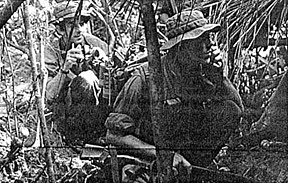 "I don't like bangs," he would explain. Nevertheless, he is compelled by
combat and drawn to it.
"I don't like bangs," he would explain. Nevertheless, he is compelled by
combat and drawn to it.
"Under the stress of combat, life becomes so intense, and so
highly-charged I think that men become somehow more human under the extreme conditions.
There is a tension between life and death out there which makes you more aware of what it
means to be alive - it's hard to become complacent about life once you've seen war. Men's
character traits become intensified - friendship love, determination, fear... Don't get me
wrong I'm not for war, I don't love war - I'm just moved by it.
He considers himself extremely privileged to have been a war correspondent.
"When I'm in Pans I see my friends there who have never seen a war.
Doctors, lawyers government workers - their lives seem so incredibly tame. They have a
house and a wife and children and cars, and it all seems so regular, so dull.
"Many people read my stones and experience the war vicariously. I think
people like to read about wars and riots and hijackings and all that and many probably
identify with the guerrillas and looters and hijackers. It's a way of escaping the routine
of their lives, like going to a movie but better because this war is really
happening."
There is obviously some of this perverse, Walter Mitty-ism in Wilson, but
instead of reading or watching a movie, he needs to be where the action is - in person.
He doesn't claim to know why people have this fascination with violence and
death – "perhaps it's a need carried over from our animal background."
Wilson was a lieutenant in the British Army Intelligence, stationed in
Germany in the late 1940s. His specialty was tracing the movements of Russian troops in
East Germany by identifying the laundry tags from uniforms sent him by behind-the-border
contacts. After his two years of National Service, he got out and studied at Oxford, where
he took a degree in Modern Languages. He speaks German, French and Italian.
During his 10 years as a war correspondent, Wilson has covered the East
African Mutinies, the Congo, the Cypress conflict, the massacre of the Ibos in Northern
Nigeria, the Indo-Pakistani War, the coup-d'etat which overthrew Algeria's Ben Bella, the
"six-day War" between Egypt and Israel, and the massacres of communists in
Indonesia and Vietnam.
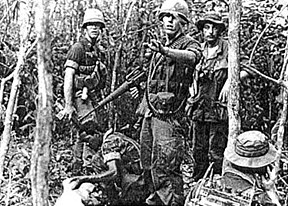 He finds the Vietnam conflict "a very accessible war" because of the powerful
position of the press in American society.
He finds the Vietnam conflict "a very accessible war" because of the powerful
position of the press in American society.
"Israel and Egypt are very security-conscious and they won't let the
press into many areas, but the Americans give us access to almost everything." He
thinks this is good, but that it probably hurts the American cause in a strictly military
sense.
Wilson recently completed two years in Vietnam, and has returned to AFP's
Paris headquarters for reassignment. But after about six weeks in Pans, he says he'll want
to get back to a war somewhere.
"I couldn't be happy doing anything besides war correspondence - I can't
seem to do without it."
[Photo captions: (Top, left) BANGS -
Correspondent Derek Wilson, who doesn’t like "'bangs," readies himself at
the cry of "Fire in the hole." (Middle, right) CHECKING
THE ACTION - While the Aero Rifle RTO tries to find out what's happening,
Wilson watches for a good picture. (Bottom, right) LOOKING
ON - Correspondent Derek Wilson looks on as Aero Rifle Platoon leader Jim
Dunham (center) prepares his troops to clear out an enemy bunker complex.
Page 7 TROPIC LIGHTNING NEWS November 23, 1970
Three Enemy Killed By
Aero-Rifle Team
By SGT MIKE CONROY
CU CHI - The Aero-Rifle team of the 25th Division's 3rd Squadron, 4th
Cavalry, guided by a Light Observation Helicopter (LOH), killed three enemy, captured one,
and uncovered a vast amount of enemy supplies and ammunition north of here recently.
Delta Troop, the air arm of the 3/4 Cav, had a LOH working in the Citadel
region when the crew spotted enemy movement. Immediately the call went out to the
Aero-Rifles waiting on stand-by at Dau Tieng. After a quick insertion they began moving
toward the enemy position.
"As we were approaching the area we saw some movement in the heavy brush
to our front," said Private First Class Steve Barkman, a machine gunner, of Niles,
Mich. "We immediately sprayed the area with M40 machinegun and M-79 fire."
The Tropic Lightning troopers continued moving forward with the chopper
providing support from above. A well-used trail was found in the area leading to the first
of a series of bunkers.
"We knew the enemy could be anywhere, so we flipped a couple of grenades
in the first bunker," said Specialist 4 Winfred Reece, a grenadier from Henderson,
Tex. "Later we found two dead enemy in it."
Several enemy were then spotted fleeing the area. The LOH took them under
fire, killing one.
A continued sweep of the area uncovered eight more bunkers. Thorough searches
of each disclosed a wide assortment of munitions and supplies.
The first structure contained two AK47s, 18 hand grenades, an M-16 rifle and
10 pounds of medical supplies. Another bunker revealed 106 rounds each of K-54 and
M-16 ammunition, 875 rounds of AK47 ammunition, four B-40 rockets, six B40 boosters, 12
M-79 rounds.
A third housed a rocket-propelled grenade (RPG) launcher and an RPG round,
one M-26 hand grenade, nine pistol belts, twenty-four rucksacks, seven flashlights and a
large amount of clothing and other supplies.
A lingering Communist was spotted in some bushes only fifty yards from the
men. Responding instantly to the LOH's warning, the Rifles shredded the position with
small arms fire. The frightened enemy then popped up with hands high in surrender.
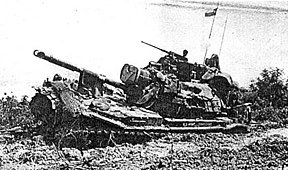 HELP! - A tank from 2nd Battalion, 34th Armor takes an unwanted mud bath while operating with the 2nd Battalion, 27th Infantry, three miles west of FSB Tennessee. (Photo by SP4 Philip Maslin) |
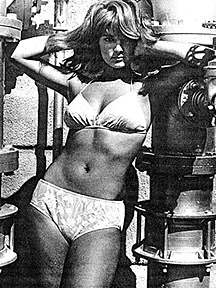 |
|
| SEA-WORTHY? - Under most circumstances, a woman on board ship is considered bad luck. However, after a brief inspection, anyone would have to admit that this young lady is quite see-worthy. |
Engineers Build New
Base
FSB Simmons Replaces Byrd
DAU TIENG - Although little more than a muddy speck in the jungle, a few
hundred feet wide and encircled by a mound of reddish dirt, the fire support base stands
out as the vital link between the giant base camp and the men in the field.
Recently, the task of carving out one of these bases was given to the 25th
Infantry Division's 65th Engineers, Alfa Company, assigned to the 1st Brigade here.
The objective was to find a better location for the existing Fire Support
Base Byrd, which was plagued with drainage problems and overcrowding.
The land was surveyed, culverts positioned, artillery pads laid, the berm
pushed up and a field of fire cleared, while troops of the 2nd Battalion, 14th Infantry
provided security.
The new base, named Fire Support Base Simmons, was completed in only a few
days.
For the time being, the engineer’s job is done, but only until the
infantry decides to move again. Then it will be a return trip to Simmons with dozers and
shovels, to push their creation back into the red Vietnamese clay from which it sprang.
Ask SGT Certain
DEAR SGT. CERT.: Each week our of office has a
small pool bet on the pro football games for the upcoming weekend. Invariably, our OIC
wins the pool. He seems to show uncanny skill in choosing the winning teams. It was as if
he had an inside track to info about the teams. Last week we discovered his ace in the
hole. His grandfather is George Blanda of the Oakland Raiders. Through his grandfather our
OIC was obtaining inside tips on how to play the bets each week We EM of the office feel
our OIC should refund his previous winnings and disqualify himself from future pools. He
refuses and has ordered us to continue allowing him to bet in our pools. Can he do this?
PVT Landry
DEAR TOM: Sorry but you EM must show the proper
respect for a ranking officer. Although he cannot order to let him bet, you likewise
cannot boycott him. Besides, if George Blanda is providing the tips for your OIC, believe
me, the odds will catch up with him and his percentage will drop...like his grandfather's
passes.
DEAR SARGE: I became greatly interested in Cu
Chi's weekly Friday night boxing matches. In fact, a couple of weeks ago, I entered one of
the matches and found myself paired with s slightly overweight soul brother. He looked
E-6ish, but definitely not the lifer type. I was shorter than he, but I am stocky and hard
to knock down. At least that's what they tell me back in my hometown of Parma Heights,
Ohio.
The soul brother was very light on his feet and kept mumbling something like
"move like a butterfly, sting like a bee." Sting me he did. And I was only able
to land a couple of solid punches. Unfortunately they were on the referee as I continually
swung and missed my opponent. Finally, the match was called a TKO. The referee was
bleeding too badly to continue.
I wanted to talk with my opponent after the fight because he was one of the
best I had ever fought. Mysteriously, he disappeared before anyone could locate him. Then
last week, I noticed a strong resemblance between my E-6 opponent and Muhammed Ali when he
fought Quarry on TV. I think I was had. I should be declared heavyweight champion of Cu
Chi. The chief of staff disagrees. I would like a rematch in New York after I ETS.
Unfortunately that is not until 1979. What are my chances?
PFC Oscar Chivago
DEAR EMMY: To coin a fraize or two: You'll have to
wait in line for your turn. Not just any old Joe can get a shot at the heavyweight title.
Page 8 TROPIC LIGHTNING NEWS November 23, 1970
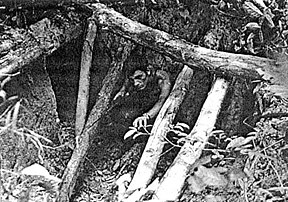 |
CAUTION -- Caution is the word, as Private First Class George Perotta of Rochester N.Y., a member of the 3rd Squadron, 4th Cavalry's "Mackenzie's Raiders" carefully checks out a recently abandoned enemy bunker. (Photo by SGT Mike Conroy) |
Informal But
Effective
Howie's Newsletter Makes It
By SP4 J. D. DRURY
CU CHI - "Conex Control - Uptight? That's what we should be, but are
we? Half empty conexes take up space and waste Army bread. Give us a call and let's
condense excess," reads a statement in a recent bulletin issued by the 25th
Division's 25th Medical Battalion S4 (logistics) office.
This and other epigrams are part of the pithy "Chairborne Rangers"
newsletter issued by Specialist 4 Curran Howard, medical battalion S4 clerk.
The idea of a fortnightly, unofficial circular on supply topics issued to
each of the medical companies, was formulated by Captain John Allegrini of Quincy, Mass.,
25th Med's S-4 officer, explained the supply clerk, familiarly known as "Howie."
It Worked Before
"The idea's not new," asserted Allegrini, "I published a
newsletter at my last assignment and it worked well there, so I thought we'd try it
again."
"All you Jock straps!" blurts another aphorism, "Athletic
equipment must now be ordered through S-4 on a 2765-1. Check appropriate regs for further
information with regard to authorization."
Informal Layout
Howard of McMinnville, Ore. stated that, "Because the letter is so
informal, it gets more attention, and more importantly, more response."
"FIRE! Ole Smokey says get with the program. Make a real inspection;
don't just fill out the report," says another one somewhat scoldingly.
Howie Hits Everyone
All areas of logistics are subject to Howie's perusal. "Cleaning
house?" he asks, "Get your 2407 (T1 for serviceability) from the maintenance
people," he adds "Make sure that your -14 is uptight!" is another word to
the wise. And, "if you're didi mauing from the Nam," states Howie, "make
sure you see 'the man' at S-4 about your TA-50."
Saves Much Work
Colleague Specialist 4 Reese Pratt of Los Angeles, S-4's records clerk, said
the newsletter has saved him a good deal of work lately, but added "I only wish he
would have started it five months earlier."
A Real Success
"Reports are coming in on time, and we're getting fewer phone
calls," added Captain Allegrini, "so I think Howie's newsletter is a real
success."
"There it is folks!" as Howie would say, "catch you next
time."
 |
PROVIDING - Providing fire support for Operation Base Lynch is this battery of 105mm howitzers of Charlie Battery, 1st Battalion, 5th Field Artillery. (Photo by SGT Richard Conell) |
Beetle Fan Prefers That
They Be Pickled
By SP4 J. D. DRURY
CU CHI - "Cu chi is crawling with belostomatidae, dytiscadae, and
cerambycidae," said the 25th Division lieutenant.
Crawling with VC spies? With rare diseases? Or what?
Actually the officer, 1st Lieutenant Miles Haberley, of the 25th Medical
Battalion, was speaking of some of the beetles he's collected in and around the Tropic
Lightning's base camp, here.
While most people prefer to step on bugs, Haberley prefers to
"pickle" them. A graduate of the University of Tennessee, the Medical Service
Corps officer has also done graduate work there in zoology and botany.
"I've always been a naturalist," said the Knoxville, Tenn., native.
"Even as a kid I had insect, plant, and rock collections." And his collecting
has continued in Vietnam.
"The beetle is a fascinating family of insects," glistened
Haberley. "Do you know there are more species of beetles (350,000) than all other
animal species in the world?" he asked.
I didn't. Other tales and statistics rolled readily from the mouth of this
most enthusiastic beetle fan.
The coleoptera (beetle) I had often extinguished with my size 10 regular
became under the entomologist's tutelage, a fascinating creature. Haberiey's collection
contains many insects indigenous to the Cu Chi area, from June bugs, through giant water
bugs, scarabs ("the males generally have the larger horns, the females the sm211er
ones", tiger beetles, bombardier beetles ("which make a raspy noise and then
emit a puff of acidic smoke,"), wood boring beetles ("whose horns are large in
order to attract the opposite sex-'), centipedes and numerous others.
Insects aren't the only members of Haberley's "pickled" menagerie
though. He also has lizards, frogs, skinks, bamboo pit vipers, Asiatic cobras, geckos,
king-sized Asiatic shrews, bats, butterflies and others. Nor does the naturalist exclude
plants and rocks from his collection.
An insection (butterfly) net is one of the few pieces of professional
equipment he has; the rest is improvised or hand-made.
"The electric light is one of my main suppliers," said the motor
officer for the med battalion's Delta Company.
"Teaching and collecting," are foremost in the Tennessean's future
plans, "and building an interesting, personal, natural history museum."
"I've gathered some pretty interesting specimens over here," stated
the lieutenant, "but I'm still looking for more." "Bug cans"
have been distributed in the medical battalion area, and the officer adds that he's
"had a little help from my friends" (the battalion's MEDCAP team, 20th
Preventive Medicine's Captain Larry Barton, and others). But the search still goes
on.
"Remember," he said as I left, "if you find any interesting or
unusual insects, snakes, animals or flowers around, be sure and let me know."
Operation Base
Lynch
More Than Meets The Eye
By SGT RICHARD CONNELL
OPERATION BASE LYNCH - From the air the 25th Infantry Division's Operation
Base Lynch looks like almost any fire support base, only bigger. However once on the
ground, Lynch turns out to be much more.
Operation Base Lynch is the home of the 2nd Brigade. Inside its bunker lines
operations against enemy forces are planned. Also inside the bunker lines are housed the
rear elements of the "Fire Brigade," the rear elements of an infantry battalion,
a small PX, a barber shop, tailor shop and even streets with street signs.
"Lynch is sort of a rustic Cu Chi," said Sergeant Tom Golec of
Lowell, Mass., NCOIC of Brigade S-5. "Of course it's a little muddy when it
rains," he added.
"I've been with 2nd Brigade since we moved from Cu Chi in early February
to Dau Tieng, then Bearcat in March, Tay Ninh - Tien Ngon in May and finally down to Xuan
Loc and Lynch," said Specialist 4 Angelo
Bascio of Philadelphia, Pa. a clerk with S-4. "It's true I’ve lived
better, but I've lived worse too.
Thanks to
Ron Leonard, 25th Aviation Bn., for locating and mailing this issue,
Kirk Ramsey, 2nd Bn., 14th Inf. for creating this page.
This page last modified 8-12-2004
©2004 25th Infantry Division Association. All rights reserved.